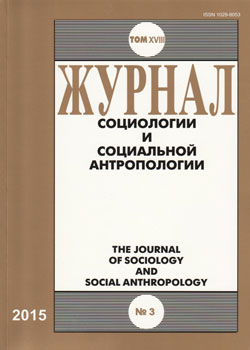Disenchanting Max Weber: a Critisism of Weberian Heritage Reception in German Neo-Weberianism
Keywords:
Weber, neo-Weberianism, Tenbruck, Hennis, Schluchter, Kultursoziologie
Abstract
The analysis is focused on specifics and dynamics of Max Weber’s work reception in sociology in general and German neo-Weberianism in particular. It shows that the reception had nonlinear and controversial character, due to changing socio-political contexts and struggles between Anglo-Saxon and German traditions in perception of Weber. The driving force for international, especially German, neo-Weberianism became Weber’s De-Parsonizing, that revealed the limitations of neoclassical perception of Weber, associated with understanding of nature and dynamics of the culture, the concepts of methodological individualism, the “Werturteilsfreiheit” (freedom from value judgement) and others. Neo-Weberianism had been significantly impacted by dispute with neo-Marxism, that perceived Weber as supporting scientistic objectivity and value-neutrality. Early neo-Weberian discussion focused on the issue of thematic unity of Weber’s legacy. Later, analysis has shifted to the methodological and epistemological foundations of Weber’s sociology. Weberian studies showed that a decisive influence on the methodological attitudes of Weber had the “Methodenstreit der Nationaloekonomie” between the historical and theoretical (Austrian) schools of economics (between G. Schmoller and C. Menger), while G. Rickert’s Neokantianism had less significant and more instrumental role. By analyzing this dispute as epistemological conflict between classical and non-classical types of science we can detect in Weber’s work a hidden post-nonclassical heuristic potential. The work of German neo-Weberians W. Hennis, W. Schluchter and F. Tenbruck had shown the clear cultural and sociological dimensionality of Weber’s legacy, as well as hidden background of (cultural) anthropology. The analysis also demonstrates the subordination of Weber’s epistemology by his humanistic praxeology (the value of free, conscious, creative and responsible person).
Published
2015-05-20
How to Cite
Kamarouski, A. (2015). Disenchanting Max Weber: a Critisism of Weberian Heritage Reception in German Neo-Weberianism . ZHURNAL SOTSIOLOGII I SOTSIALNOY ANTROPOLOGII (The Journal of Sociology and Social Anthropology), 18(3), 5–18. Retrieved from http://jourssa.ru/jourssa/article/view/395
Section
Social Theory

